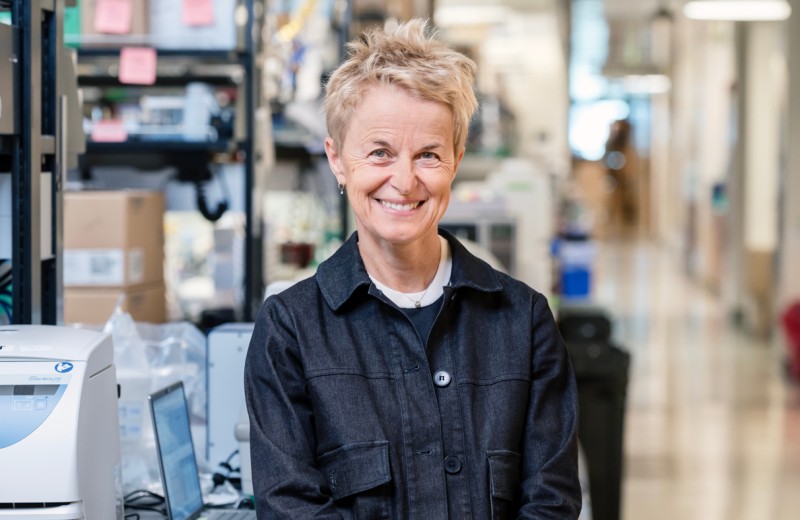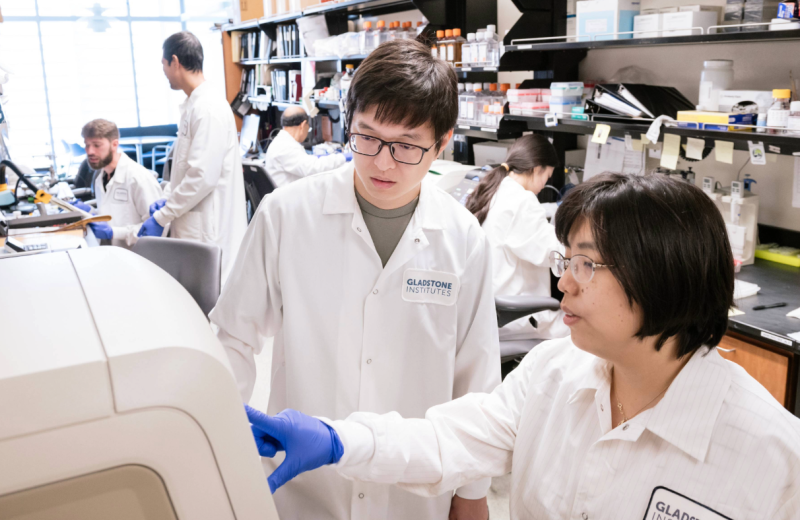Gladstone NOW: The Campaign Join Us on the Journey✕
Visit GladstoneNOW.org to learn more about the campaign.
Citing the arrival of a “revolutionary moment in science and medicine,” Deepak Srivastava, MD, president of Gladstone Institutes, announced a five-year, $350 million campaign to add more than 300 scientists and 15 state-of-the-art laboratories, develop the next generation of biotechnologies, and advance discoveries to the clinic as rapidly as possible.
Pioneers in the fields of computational biology, genome editing, and regenerative medicine, Gladstone scientists are harnessing the immense potential of artificial intelligence to probe the depths of massive data sets and discover cures for humankind’s most devastating diseases, including Alzheimer’s, heart failure, cancer, deadly viruses, Parkinson’s, and diabetes.
“Because of breakthroughs made in the last decade, we no longer have to accept disease,” Srivastava says. “Every day in our labs, we are seeing unmistakable signs that we can overcome it. Not someday, not in the distant future, but now.”
To realize that ambition, the Gladstone NOW campaign will be organized around four strategic imperatives:
- Scale Wisely by adding 100,000 square feet of lab space and more than 300 intellectually daring, multidisciplinary scientists all working together to overcome disease;
- Catalyze Breakthroughs with precisely targeted funding for high-risk, high-reward research;
- Build a Computational Powerhouse to unlock the potential of AI x biomedicine; and
- Close the Gap between the moment of discovery and the minute that cures and new therapies reach patients around the world.
“We are working on exceptionally complex and difficult problems,” says Robert Wicks, CEO of the Gladstone Foundation. “Curing disease, preventing neurodegeneration, reengineering our immune systems, regenerating damaged hearts, combating deadly viruses. It would be hard to overstate the role visionary philanthropists are playing in making these goals possible. They are the driving force—and, in many cases, the primary source—of funding behind the most improbable but highest potential research.”
Bringing together more than 600 biologists, chemists, engineers, and data scientists, Gladstone has become one of the world’s preeminent nonprofit research institutions since its founding in 1979. Known for its singular focus on disease research, Gladstone is composed of five deeply interconnected institutes specializing in the areas of cardiovascular disease, neuroscience, virology, immunology, and data science and biotechnology.
Home to Nobel laureates Jennifer Doudna, PhD, and Shinya Yamanaka, MD, PhD, Gladstone is also at the forefront of CRISPR-based genome editing and pluripotent stem cell biology, which advance research across all institutes, and is a global leader in using AI to study the mechanisms underlying disease.
“We have an opportunity to end suffering on a massive scale, to cure diseases that impact millions around the world, and to push medicine past the boundaries of what was once thought possible.”
Notable achievements of Gladstone scientists include discovering an anti-clotting drug that revolutionized treatment for acute coronary syndrome, leading a global study that resulted in FDA approval of the HIV pre-exposure prophylaxis (PReP) drug Truvada, and developing spinoff companies with therapeutic candidates now in clinical trials for Alzheimer’s disease and heart failure. In the past decade alone, the institute has launched a total of 16 companies that leverage Gladstone technology, backed by nearly $1 billion in private and public financing, as it advances its discoveries toward patients.
“For some diseases—not all, not yet—the finish line is in sight,” Yamanaka says. “The tools we are building now will change the lives of patients around the world in ways that would have seemed impossible a decade ago.”
Gladstone brings a special strength in understanding the basis of human disease and discovering mechanisms that can be targeted for treatments or potential cures. Due to its independent structure and affiliations with top academic institutions and industry partners, Gladstone is able to pursue new angles of discovery without the weight of bureaucracy and advance its research to the patient on an accelerated timeline.
“We have an opportunity to end suffering on a massive scale, to cure diseases that impact millions around the world, and to push medicine past the boundaries of what was once thought possible,” Srivastava says. “I want to thank our trustees and the members of the Gladstone Foundation Board for their advice and guidance as we launch the institution’s first complex capital campaign. With the help of passionate volunteers and supporters, I am confident that science will overcome disease.”
To learn more about the campaign and get involved, visit GladstoneNOW.org.
For Media
Kelly Quigley
Director, Science Communications and Media Relations
415.734.2690
Email
About Gladstone Institutes
Gladstone Institutes is an independent, nonprofit life science research organization that uses visionary science and technology to overcome disease. Established in 1979, it is located in the epicenter of biomedical and technological innovation, in the Mission Bay neighborhood of San Francisco. Gladstone has created a research model that disrupts how science is done, funds big ideas, and attracts the brightest minds.
Featured Experts
One Person’s Final Gift to Science Gets Us Closer to an HIV Cure
One Person’s Final Gift to Science Gets Us Closer to an HIV Cure
A new documentary follows Jim Dunn’s end-of-life decision to donate his tissues to HIV research.
Institutional News HIV/AIDS Infectious Disease Roan LabBeyond Viruses: Expanding the Fight Against Infectious Diseases
Beyond Viruses: Expanding the Fight Against Infectious Diseases
The newly renamed Gladstone Infectious Disease Institute broadens its mission to address global health threats ranging from antibiotic resistance to infections that cause chronic diseases.
Institutional News News Release Cancer COVID-19 Hepatitis C HIV/AIDS Zika Virus Infectious DiseaseFueling Discovery at the Frontiers of Neuroscience: The NOMIS-Gladstone Fellowship Program
Fueling Discovery at the Frontiers of Neuroscience: The NOMIS-Gladstone Fellowship Program
The NOMIS-Gladstone Fellowship Program empowers early-career scientists to push the boundaries of neuroscience and unlock the brain’s deepest mysteries.
Institutional News Neurological Disease Mucke Lab NOMIS




